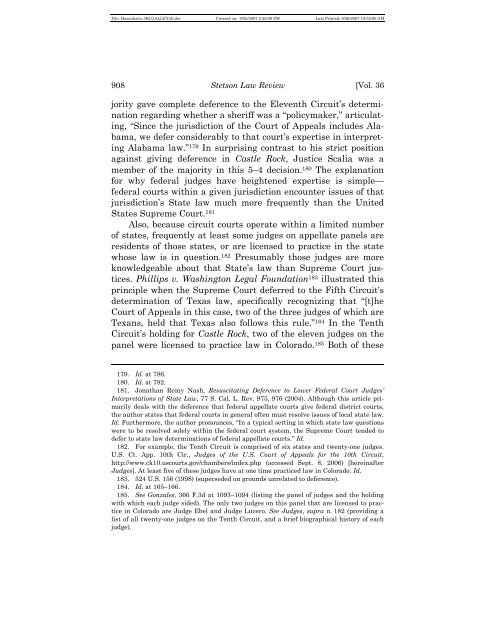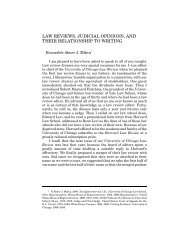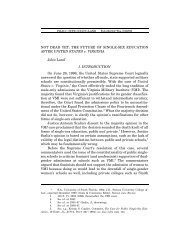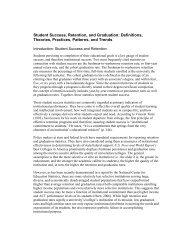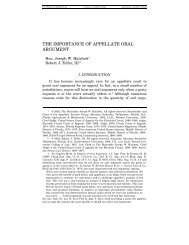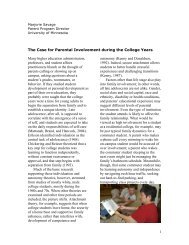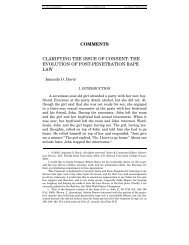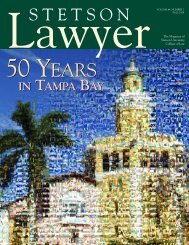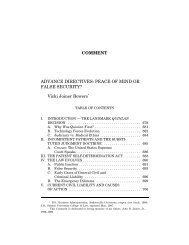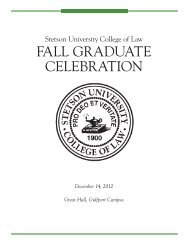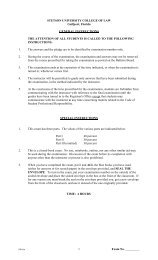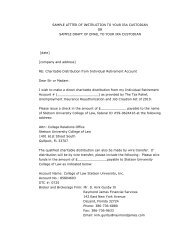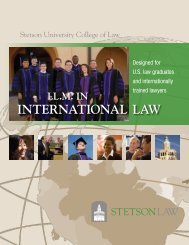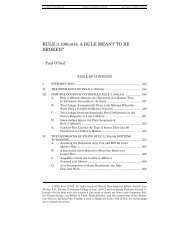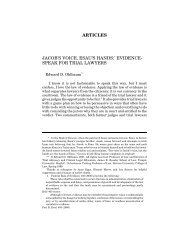TOWN OF CASTLE ROCK v. GONZALES: THE ... - Stetson University
TOWN OF CASTLE ROCK v. GONZALES: THE ... - Stetson University
TOWN OF CASTLE ROCK v. GONZALES: THE ... - Stetson University
Create successful ePaper yourself
Turn your PDF publications into a flip-book with our unique Google optimized e-Paper software.
File: Hasanbasic.362.GALLEY(d).doc Created on: 9/25/2007 2:29:00 PM Last Printed: 9/26/2007 10:35:00 AM908 <strong>Stetson</strong> Law Review [Vol. 36jority gave complete deference to the Eleventh Circuit’s determinationregarding whether a sheriff was a “policymaker,” articulating,“Since the jurisdiction of the Court of Appeals includes Alabama,we defer considerably to that court’s expertise in interpretingAlabama law.” 179 In surprising contrast to his strict positionagainst giving deference in Castle Rock, Justice Scalia was amember of the majority in this 5–4 decision. 180 The explanationfor why federal judges have heightened expertise is simple—federal courts within a given jurisdiction encounter issues of thatjurisdiction’s State law much more frequently than the UnitedStates Supreme Court. 181Also, because circuit courts operate within a limited numberof states, frequently at least some judges on appellate panels areresidents of those states, or are licensed to practice in the statewhose law is in question. 182 Presumably those judges are moreknowledgeable about that State’s law than Supreme Court justices.Phillips v. Washington Legal Foundation 183 illustrated thisprinciple when the Supreme Court deferred to the Fifth Circuit’sdetermination of Texas law, specifically recognizing that “[t]heCourt of Appeals in this case, two of the three judges of which areTexans, held that Texas also follows this rule.” 184 In the TenthCircuit’s holding for Castle Rock, two of the eleven judges on thepanel were licensed to practice law in Colorado. 185 Both of these179. Id. at 786.180. Id. at 782.181. Jonathan Remy Nash, Resuscitating Deference to Lower Federal Court Judges’Interpretations of State Law, 77 S. Cal. L. Rev. 975, 976 (2004). Although this article primarilydeals with the deference that federal appellate courts give federal district courts,the author states that federal courts in general often must resolve issues of local state law.Id. Furthermore, the author pronounces, “In a typical setting in which state law questionswere to be resolved solely within the federal court system, the Supreme Court tended todefer to state law determinations of federal appellate courts.” Id.182. For example, the Tenth Circuit is comprised of six states and twenty-one judges.U.S. Ct. App. 10th Cir., Judges of the U.S. Court of Appeals for the 10th Circuit,http://www.ck10.uscourts.gov/chambers/index.php (accessed Sept. 8, 2006) [hereinafterJudges]. At least five of these judges have at one time practiced law in Colorado. Id.183. 524 U.S. 156 (1998) (superseded on grounds unrelated to deference).184. Id. at 165–166.185. See Gonzales, 366 F.3d at 1093–1094 (listing the panel of judges and the holdingwith which each judge sided). The only two judges on this panel that are licensed to practicein Colorado are Judge Ebel and Judge Lucero. See Judges, supra n. 182 (providing alist of all twenty-one judges on the Tenth Circuit, and a brief biographical history of eachjudge).


